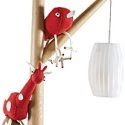What gets me about nursing though, is OTHER people's reactions. Generationally, my mother didn't understand why I would want to. She bottle fed me and I turned out fine, right? (This is from the same lady whose generation snuck whiskey into baby bottles for teething. Sure, it made the pain go away! A little Jack and Pablum could make rheumatism feel better!) Single friends were visibly curious, then disgusted as they watched let down stains slowly spread across my chest while waiting for the baby to wake up. Even my husband occasionally flinched when I would nurse. Oh wait. That's probably because I would squirt him from across the room with the unoccupied breast. Never mind.
Inevitably, at some point during your nursing . . . many points if you plan on having any semblance of a life . . . you will face the controversy of NURSING IN PUBLIC! There you are, walking calmly through the mall, enjoying being out in the real world, and the tiny bundle in the stroller erupts like Vesuvius. You recognize the cry as one of hunger. Your breasts recognize the cry (yes, your breasts have ears) and immediately begin to flow. I defy anyone to try to tell a hungry infant OR a pair of milk happy orbs, to be patient. So, I would pull out the blanket, cover up the proceedings and sit quietly on a bench. The looks I would receive ranged from understanding smiles (other moms) to curiosity (teenage boys) to downright disapproval (Reverend Falwell. I mean what was I hiding under that flannel cabana? Tinky Winky, I feel your pain.). One person was so intrigued, they sat down next to me and stared. I asked if I could see their ticket. What? Well, surely if you are going to watch the show, you paid admission at the door, didn't you? They quickly departed.
Yes, I suppose it is possible to run around and find a bathroom, fitting room, or rack of clothes to hide in, but I guess I will never understand the "boob phobia" that is out there. Honestly, have those people who think there is something sexual about the nursing breast, ever SEEN one? I can think of nothing farther from a turn-on! (And I am including Reverend Falwell!) And if a person is so offended by it being done, WHY ARE THEY WATCHING?
Whether you follow the bible or subscribe to Darwin, one thing is the same, breasts were put here for this purpose. A woman gives birth and they fill up with milk, thus enabling her to feed her offspring, if this is the method she so chooses. So, if nursing is a choice you make, be tolerant, remember it is a natural, beautiful thing, and that "Beauty IS in the eye of the beholder." But if that person ever sits down next to you in the mall to watch? You have my permission to change it to "MILK is in the eye of the beholder." Ready, aim, fire!
Last week's CrocTalk: Companies Who Are Making A Difference
 Continuing with last week's theme of constructive consumerism here are a few of the companies that Crocodile has chosen to support. These companies, Bholu and Under the Nile, not only create their hand crafted merchandise with organic and sustainable materials but they also incorporate philosophies of fair trade manufacturing giving back to communities around the world to improve the lives and education of their workers.
Continuing with last week's theme of constructive consumerism here are a few of the companies that Crocodile has chosen to support. These companies, Bholu and Under the Nile, not only create their hand crafted merchandise with organic and sustainable materials but they also incorporate philosophies of fair trade manufacturing giving back to communities around the world to improve the lives and education of their workers. Bholu
The Bubalahs by Bholu are the work of Australian designer Jodie Fried. Designed in Australia, the Bubalahs are brought to life by the hands of traditional Indian artisans. Each piece is hand made using ancient techniques, giving each product its own unique and original personality.
The philosophy behind Bholu is about creating products that we love and live with, while benefiting communities we work with along the way. By using their traditional skills, the artisans gain an income hence independence and opportunity.Bholu, is a Fair Trade and Climate Neutral Company and part of proceeds go back to the women and their communities, along with funding educational facilities and other programs for underprivileged children. In 2008 Bholu won the NSW Telstra Business Award for Social Responsibility for demonstrated leadership by a business for the environment, people, education, and the community.
Under The Nile
Under the Nile Organic Teethers come in fun fruit and veggie designs. Through these teethers Under the Nile is doing more than just helping kids make a positive association with healthy foods. They are also proud participants of the 13-Villages-Project an initiative to fight against poverty and its causes in rural Egypt.
The 13 Villages Project is a campaign co-conducted by Under the Nile and its Farm in Egypt (Sekem). It takes place in 13 rural villages in Sharkeya, Egypt. Through vocational training and infrastructural development, the project is improving the health, skills and overall well being of the village inhabitants. They provide excellent health care as well as education on dental and over all physical health. They begin by educating the villagers on how to make our fruit and vegetable toys. Each village receives an advance for their work and the materials needed to produce that toy. Upon completion, Under the Nile pick up the finished goods and pay them fair wages for their work.






